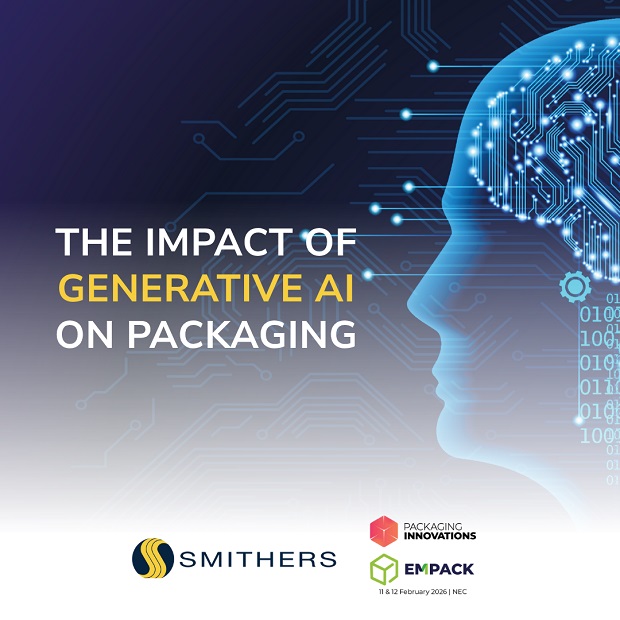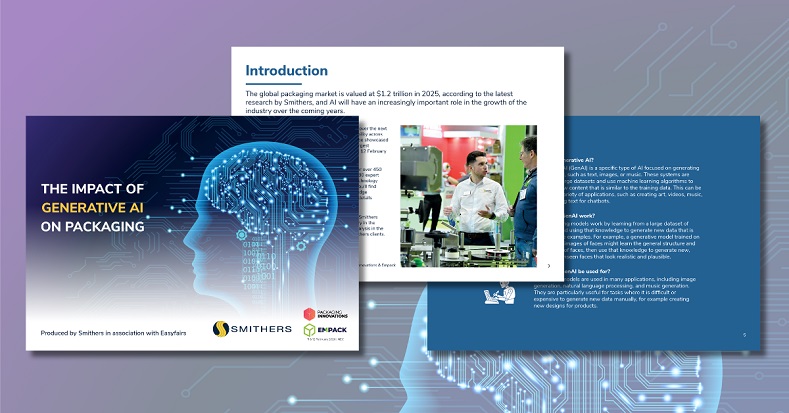Generative AI is set to reshape the $1.2 trillion global packaging market, driving faster product launches, smarter supply chains, and greater efficiency, according to a new report.
 According to a new report from Packaging Innovations & Empack’s official research partner, Smithers, the global packaging market is valued at $1.2 trillion in 2025, with generative AI (GenAI) emerging as a major driver of growth, creativity, and efficiency across the sector. The research highlights how AI is transforming packaging design, production, and supply chain processes, enabling brands to launch products faster, reduce costs, and respond more effectively to shifting consumer demand.
According to a new report from Packaging Innovations & Empack’s official research partner, Smithers, the global packaging market is valued at $1.2 trillion in 2025, with generative AI (GenAI) emerging as a major driver of growth, creativity, and efficiency across the sector. The research highlights how AI is transforming packaging design, production, and supply chain processes, enabling brands to launch products faster, reduce costs, and respond more effectively to shifting consumer demand.
 “Every decade brings a new technology that reshapes the way we work – from the personal computer to the internet, mobile devices, and the cloud,” said Josh Brooks, Divisional Director – Packaging Portfolio at Easyfairs. “Now it’s AI. Global investment in AI infrastructure is expected to reach $2 trillion in 2026, and the potential for packaging is immense. From creating personalised designs to optimising production lines, AI gives the industry the chance to rethink how we design, produce, and deliver packaging at scale.”
“Every decade brings a new technology that reshapes the way we work – from the personal computer to the internet, mobile devices, and the cloud,” said Josh Brooks, Divisional Director – Packaging Portfolio at Easyfairs. “Now it’s AI. Global investment in AI infrastructure is expected to reach $2 trillion in 2026, and the potential for packaging is immense. From creating personalised designs to optimising production lines, AI gives the industry the chance to rethink how we design, produce, and deliver packaging at scale.”
Smithers’ report paints a clear vision for the future of packaging. GenAI is already lowering barriers for creativity, driving rapid growth in personalised and virtual content, and generating versatile packaging formats on demand. Brands can launch products with greater confidence, guided by deeper insights into consumer preferences, while reducing the time and cost of experimental trials. Integration with digital printing, finishing, and automated forming machines, combined with intelligent packaging, could transform supply chain management and customer communication.
Smarter AI-driven systems are also improving stock management, efficiency, and waste reduction. Rising SKU numbers, shorter runs, and increasing demand for customisation are driving flexible packaging lines, while e-commerce is using AI to create custom-sized packaging for individual deliveries. Robotics and collaborative robots enhance line flexibility without slowing production, while predictive AI helps mitigate operational risks.
The report highlights further innovations, including “right-sizing” packaging to cut costs and improve sustainability, rapid line reconfiguration for complex shapes, and micro-fulfilment centres enabling 24-hour delivery. Real-time data allows companies to respond instantly to changing demand, promotions, or weather events, while self-learning AI supports a fully circular economy.
Generative AI is also transforming the creative process itself. Bespoke graphics can be generated on demand, enabling rapid prototyping and customisation, while AI agents adjust designs in response to market trends and consumer feedback. By 2025, AI is being applied across text, code, images, video, and 3D content, with outputs expected to outperform professional designers and developers by 2030, marking a step-change in productivity and creativity across packaging.
“Packaging Innovations & Empack is where the future of packaging comes to life,” added Brooks. “Visitors will see firsthand how AI, automation, and sustainable solutions are shaping every stage of the supply chain, from design and production to delivery. It’s the perfect place to explore innovation, discover new technology, and connect with the industry’s leading experts.”
You can explore the full impact of GenAI across the packaging supply chain at Packaging Innovations & Empack 2026, the UK’s largest packaging and processing event, taking place on 11 & 12 February at NEC Birmingham. Join over 450 leading suppliers, 7,400 professionals, and more than 80 expert speakers to showcase cutting-edge materials, machinery, smart automation, and sustainable solutions – and register for your free visitor pass today.
Access the exclusive white paper for deeper insights into GenAI’s impact on design, production, and the future of packaging.





Comments are closed.